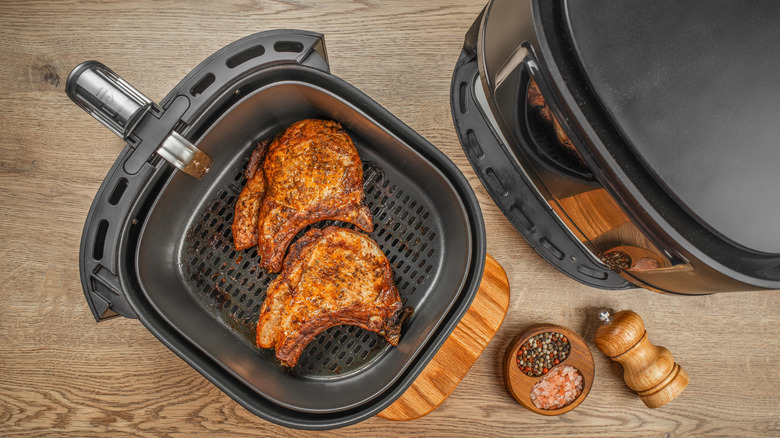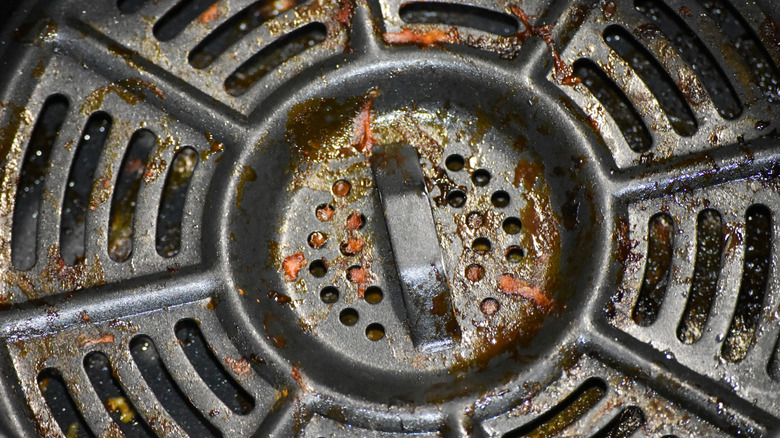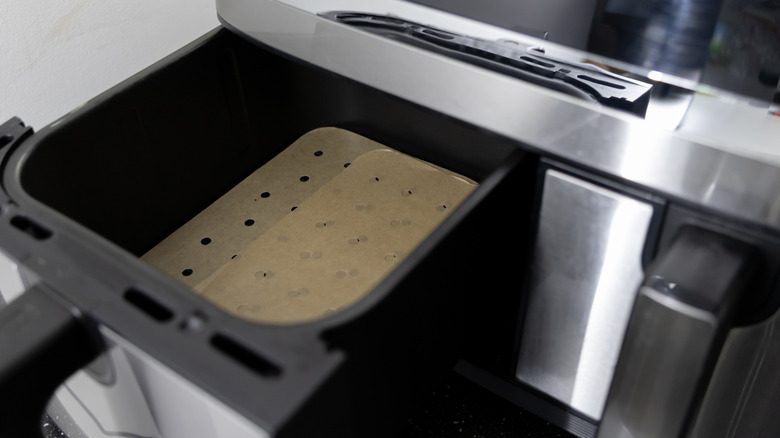How To Know When Your Air Fryer Needs A Deep Clean (And How To Clean It Less Often)
Your air fryer works hard to deliver crispy, delicious meals over and over again, but without proper cleaning and maintenance, it can quickly become a useless tool taking up space in your kitchen. Recognizing the signs that your appliance needs attention helps extend its lifespan and ensures better performance. The most obvious indicator would be visible grease buildup on the heating element or fan, which usually looks like dark or sticky spots. Lingering odors are another noticeable issue and can transfer bad flavors into cooked dishes. Uneven cooking is another obvious sign that your air fryer needs attention. When normally crispy foods come out soggy or undercooked, debris may be messing up the airflow somewhere. A good deep cleaning is also important for your new air fryer and can save you from that awful plastic smell that tends to come with fresh-out-of-the-box appliances.
Some of the less noticeable issues are small changes in your air fryer's operation. If you notice it taking longer to preheat or making louder sounds than usual, grease and dirt may have accumulated around internal parts. Luckily, many units will display error codes or overheating warnings when the ventilation becomes obstructed. For basket-style models, always check underneath the removable tray — hidden grease and crumbs can easily build up there, creating smoke or smells during cooking. Paying attention and catching these things early will help prevent permanent damage and keep your air fryer working great.
How to deep clean your air fryer properly
A proper deep cleaning begins with unplugging the unit and making sure it's completely cooled. For most models, you'll remove the basket, tray, and any other removable components. These parts can usually be cleaned in the dishwasher, but if not, let them soak in warm, soapy water for about 10 to 15 minutes to help loosen any grease. Then grab a soft-bristle brush or sponge, and start cleaning these parts. Make sure you get into any mesh areas or perforated surfaces where oil and grease can accumulate. Stick with a soft microfiber cloth, and avoid any harsh scrubbers on the inside of the basket so you don't damage the nonstick coating. If you find yourself fighting some stubborn residue on the trays, a baking soda and water paste is a common household item that can easily revive burnt pans and could also help on your air fryer parts.
Once those are finished, you'll want to move to the air fryer itself. Wipe down the entire inside chamber with the microfiber cloth, making sure to brush out any crumbs left inside. For units with visible fans, take a cloth and dampen it with that same baking soda mixture or a little vinegar. Then, carefully wipe the blades as clean as you can get them. If you have access to the heating element, you can use the same method but with a small cotton swab to get into those small areas without damaging anything electrical. Once finished, make sure everything has enough time to dry completely before reassembling. Doing this simple deep clean every few months, combined with regular wipe downs after use, will keep your air fryer functioning like new for many years.
How to keep your air fryer cleaner between deep cleans
A deep clean is nice, but it's much easier to take time to maintain your appliance between cleanings. Using parchment paper designed for air fryers will help catch messy drips while allowing proper airflow during cooking. Discard the liner when you're done cooking. It can also help to spray the tray with non-stick cooking spray to prevent grease and food from sticking. After each use, while the unit is still a little warm, wipe interior surfaces with a damp paper towel. This will help remove grease before it gets a chance to harden. Also, avoid overcrowding the basket as packed-in food can lead to more mess and uneven cooking.
Cooking your food strategically also helps minimize mess. Patting proteins dry before cooking reduces grease splatter, and using light oil sprays instead of regular liquid oil prevents pooling at the bottom of the basket. For extra messy meals, like wings or bacon, place a piece of bread in the bottom of the basket to help absorb excess grease. Skip sharp or metal kitchen utensils and abrasive cleaning tools, which can remove the non-stick coating and allow food to stick more. With these small adjustments and regular deep cleaning, you'll be able to rely on your air fryer for years to come. However, if things have progressed too far and you're in the market for a new air fryer, make sure to do a little research and avoid unreliable air fryer brands that will only cost you more time and money in the long run.


